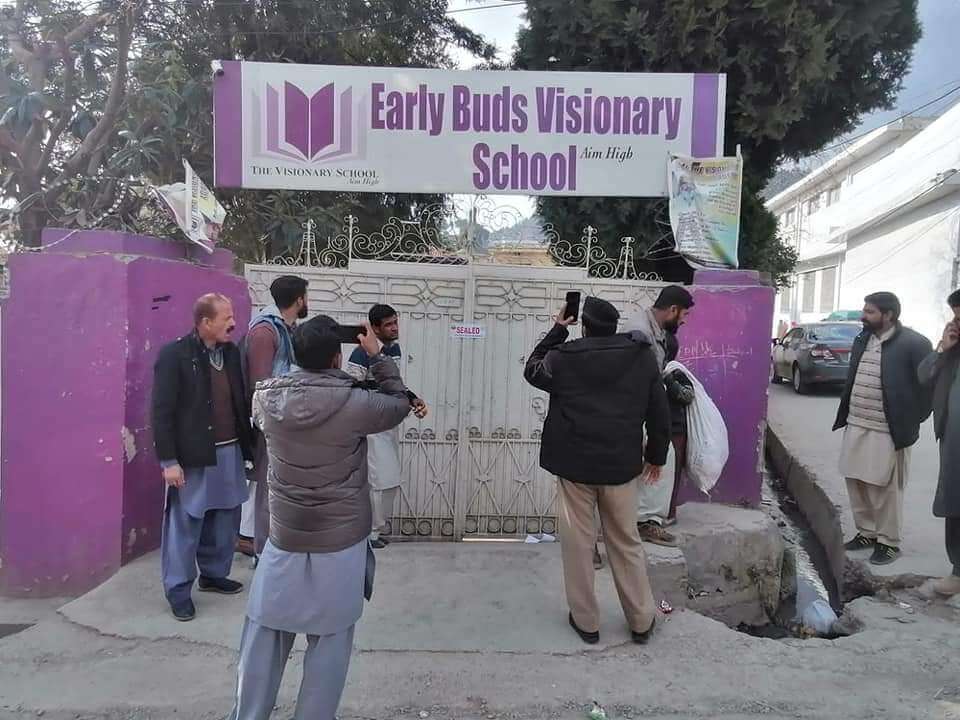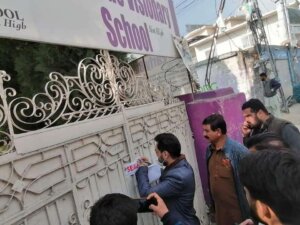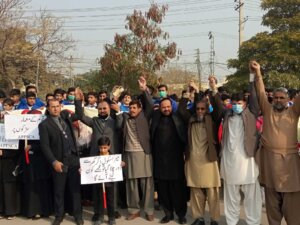
Is the state violating Right to Education of over two million students by closing low-cost private schools in Cantonment Areas
The future of over 2-4 million economically-deprived children seems uncertain as they become helpless victims of the mindless laws, state policies, bureaucratic practices and court directions which conveniently translate into a denial of education to them. On the morning of 21st December in Rawalpindi, just four days before Christmas, officials from the Cantonment Board arrived at a local school to put a seal on the premises without even considering that children and teachers were still inside taking their lessons. It was only after the helpless cries of the terrified, clueless little souls from inside the building did the passersby residents and the media capture their plight. It subsequently prompted the officials to return and let these children go back to their parents. This news may have managed to capture the necessary public attention for the time being and will compel everyone concerned to point fingers on such abrupt closure of the schools, but all this may never be enough to remove the trauma and the hurt from the memories of our young learners over this cruel treatment by the state and concerned authorities. What is more concerning is that the majority of the children enrolled at these schools belong to parents who can afford no more than Rs. 500 to Rs. 1,000 in school fees a month, as compared to other nearby private schools that comparatively fortunate parents can afford to send their children to.
“If you look into the dynamics of these children and the areas where they reside, a majority have caregivers working as petty laborers and domestic workers at the homes of affluent families. They are not rich enough to send their children to higher-end private schools, and public schools that are present have capacity issues or don’t have the outreach for them. They live in unstructured settlements, sometimes in the pockets of posh and affluent areas and don’t have the facilities that other residents in whose houses they serve, enjoy. In fact, majority of the areas falling under army lands are not as “posh” as commonly perceived. The fact remains that low income families remain marginalized because nobody cares for them, and such insensitive actions by the authorities will further take away opportunities for them to progress,” says one school owner who is affected by the recent court order which will have serious implications on the Right to Education article falling under clause 25-A for the millions of underprivileged children. Malik Ibrar Hussain, Central President of All Pakistan Private Schools and Colleges Association, further points out that despite having resource and quality shortfalls in the majority of low income schools, parents prefer to send their children there for the ease of distance and low education expense. These schools also provide an economic opportunity for many graduate women who opt to teach children at the convenience of their home or of the schools that have opened in the same neighborhood. However, the closure of such schools in all cantonment areas across the nation will further mean 450,000 teaching staff will lose their employment, as per the estimates provided by All Pakistan Private School Association.
What is the controversy?
The controversy arose in the wake of the Supreme Court order in 2018 that has directed the Attorney General and the Secretary of Defence to ensure that “all private educational institutions i.e. schools, colleges etc. and all commercial buildings in the residential areas are removed”. The honorable judge also expressed concerns of the residents that the “sanitation condition will worsen because hundreds of children would definitely create multiple problems like pollution, garbage etc.” in addition to the problem of these children consuming water resources.
While remaining on merit on the basis documentary evidence against the violation of the Cantonment Act, its rules and bylaws, the honorable judge has also showed concern over the commercial and money generating activities on cantonment lands that were originally meant for residential purposes. The order-sheet reiterated twice that no school can be allowed other than the ones established by Cantonment itself and has further called out on the criminal behavior of the Cantonment Officials responsible for allowing such to take place by completely disrespecting the laws. The timelines and ambiguities regarding that order were further clarified through another directive issued by the bench comprising of the then Chief Justice Saqib Nisar, Faisal Arab and Munib Akhter in 2018, which granted a 3 year ultimatum for the schools to remove their premises from residential areas and shift them else where. This deadline is ending on 31st December, 2021. A few schools have started facing closures prematurely, as we have witnessed in Rawalpindi.
where. This deadline is ending on 31st December, 2021. A few schools have started facing closures prematurely, as we have witnessed in Rawalpindi.
This 2018 Supreme Court judgement is the culmination of the tedious legal battle that initiated in 2003, over an allegedly deliberate omission of the clause of a sale-deed which strictly prohibited use of residential land for commercial activities, and it was subsequently used to justify the land to be used for a school. This case has been subjected to 11 reviews, 6 out of which have been in favor of the school while the rest asserted on the violation of the laws under Cantonment Act. The 2018 also upheld the previous high court decision and dismissed the petition filed on behalf of the school stating the obvious rules violation.
Limited school options for the underprivileged in Cantonment Areas
For the understanding of our readers, at present there are three types of schools/education institutes that are operational in cantonment areas. The APS (Army Public School) and FG schools (Federal Government Schools) that are maintained under APS Secretariat at General Headquarters for Army or the relevant Cantonment and Garrison Education Directorate, whereas the third type of schools are the private institutions, which unlike APS or FG schools, abide by the provincial or federal laws on education. Most of these private institutions are also registered or affiliated with federal or district education authorities. While the FG schools charge nominal fees and have outreach issues, an APS school on average charges Rs. 6-7 thousand rupees as opposed to a low cost private schools that charge between Rs.500 to 1,500.
Singling out small private schools from other prevalent illegally established commercial businesses in all cantonment and military areas is grossly unfair and unjust. The question remains where will the rest of children go if their pockets don’t allow them to attend APS? The high-end private schools that the affluent class can afford will least be affected, as they have the means to shift and maintain outreach for their students. The axe will fall on the small schools, that have the wider appeal for low-age working class. Such school at least offered them affordable options, but robbing them of it is indicative of the blatant denial of access to education.
There is also a need to substantiate the perception that low-cost private schools are engaged in commercial activities. This alone cannot be assessed without bringing into equation another supreme court judgement that has restrained all such schools from making profits beyond a limited margin and mandating them to provide free education to at least 10% of all enrolled students. This formula might work for elite private schools. But it leaves a very little chance for low income schools to make any considerable profit, if at all.
Is the disregard for RTE deliberate?

While the Supreme Court judgement of 2018 comes on strong ground, however it does leave very serious implications for low cost schools in an already difficult situation where government spending on education remains shamefully low. With out-of-school children hovering between 19 to 25 million at present, and learning poverty for those already enrolled falling somewhere between 79% to 91%, the future of Pakistan, which is tied with the future of our children, seems bleak and much without hope for rescue. It is a situation that called for finding plausible solutions for bringing children into the ambit of education, but instead, the state and all three pillars of it are more concerned about children causing “sanitation problems” and consuming “water resources” meant for the privileged families in the neighborhood whom the caregivers of these children serve. No such official due diligence is observed when other unlawful commercial activities take place uninterrupted, and much to the annoyance of residents in cantonment areas. For example the marriage tents that host functions go on with loud music till late into the nights. No one talks about haphazard establishment of Sunday Bazaars and the crowds they pull in the middle of residential areas. No one talks about the illegally established road side tea shops and street bakeries, paid parking lots on empty plots, or the suspicious guest houses, or other shady means of income generation of the underground. The concern is raised only if a school is established and is suitable for the children of domestic workers. Is this not a classic case of education class apartheid that this government under the PTI leadership so keen to remove?
Where is the respect of our children and their rights? Different pretexts are being used to close down schools, including the steps involving the magistrates to supervise and seal schools where Quran Education is not properly provided.
Where is Article 25-A? Can we not save Pakistan’s future? A time is not far when Pakistan will no longer be able to see any locally educated doctors, engineers, architects, pilots, scientists, teachers to run the economy. All that will be left are the children that grew into darkness and had no skills or knowledge or vocations to compete with the world. That is when it will already be too late for the state to realize the tragic mistakes it is making now by denying education to our precious children.
What would be ideal?
- Perhaps, all laws, directives and polices that are responsible for denying or obstructing (knowingly or unknowingly) education access need to be updated and revised by taking into consideration the serious education gaps. Until that is done, schools (especially low cost school) should be considered for exception to the rules under special considerations. The school should not be closed unless children are being criminally or financially exploited there.
- A more mindful language is needed in all official correspondence or directives when it comes to children and their right to education. A disregard for the person of the children by holding them responsible for disturbing environment for merely attending school is not only shameful, but also reckless.
- The monopoly of one school type (Army in case of cantonment lands) over others will be harmful for small education investors that Pakistan desperately needs to fix its school availability lapses. The idea should be to encourage healthy competition that can help children reach their accessibility, affordability and quality goals for education.
- We need to make Article 25-A implemented across all regions (federal or provincial) of Pakistan. We need to facilitate even those children who are being denied citizenship rights for no fault of theirs.
- We need more sensitization programs for all bureaucrats, government officials and staff, including the members of the judiciary on RTE of children. We also need more protection for children and their parents from getting financially exploited at the hands of some schools, but not by closing down education facilities as a result.
- A rationalist approach while empathizing with children deprived of educational and economic opportunities is needed. This means that conscientious discretion is required when a state law, policy or a court directive is aimed at closing down thousands of schools across the country.



